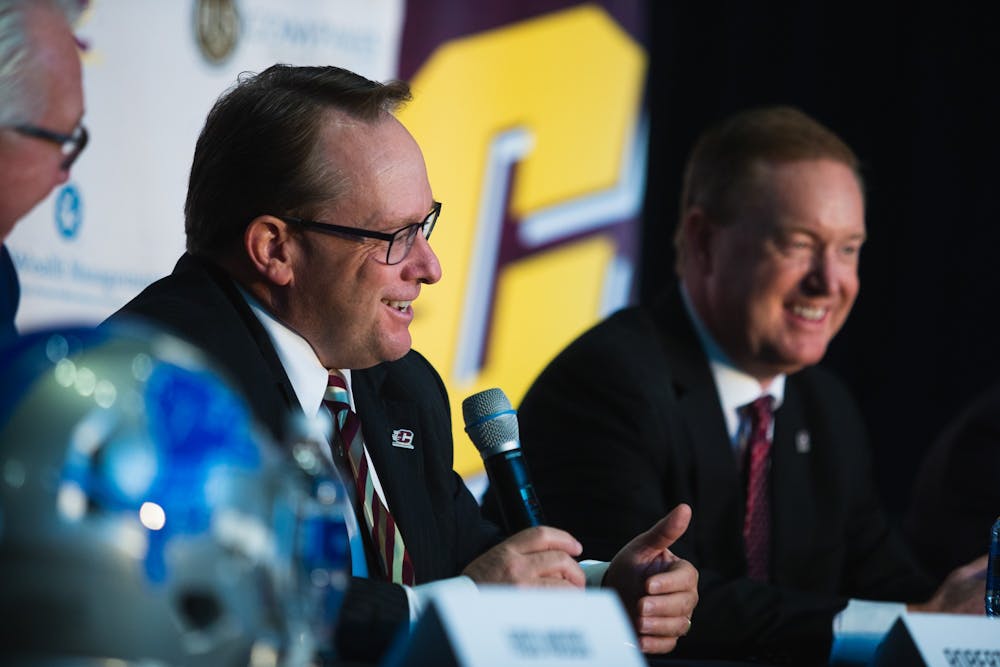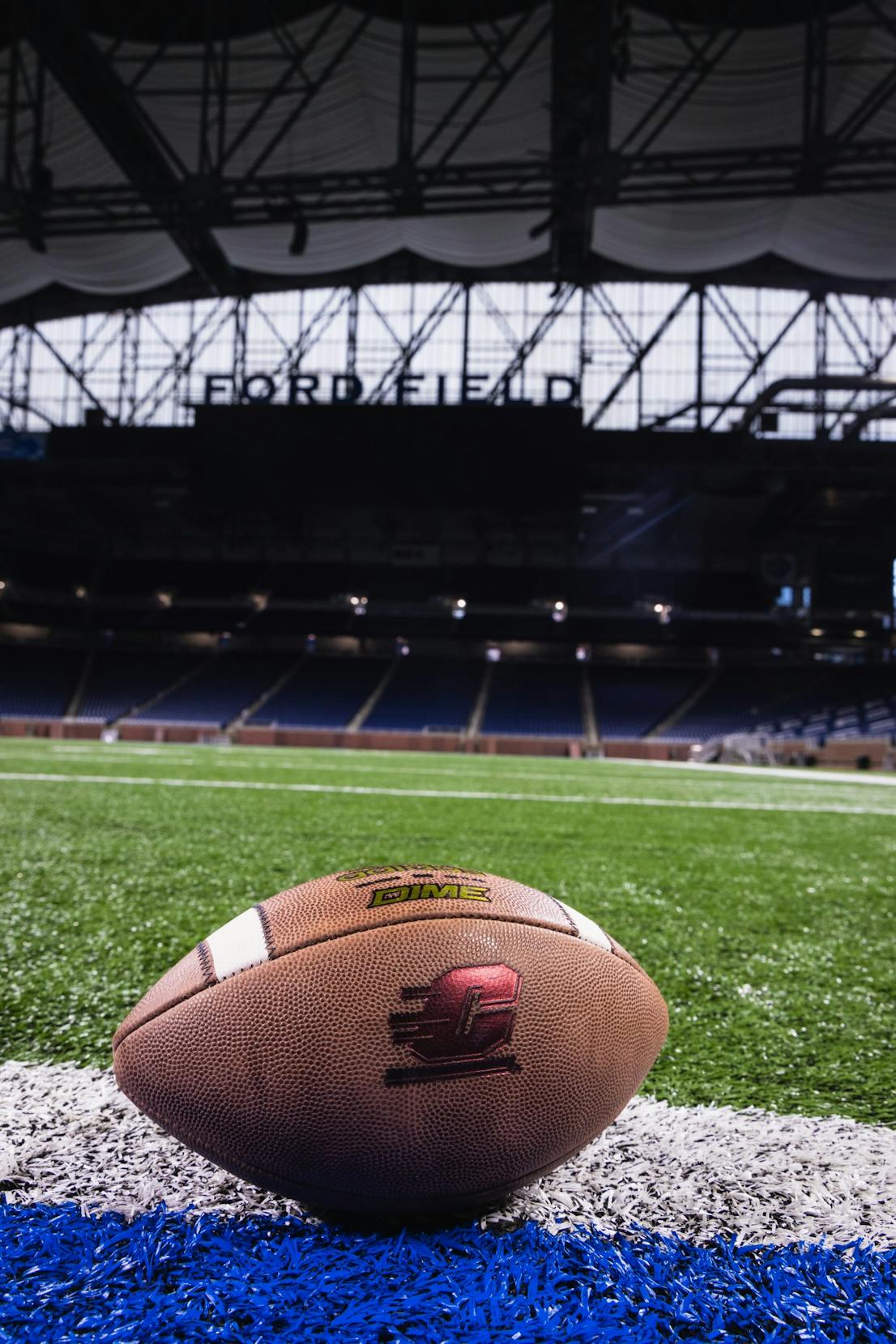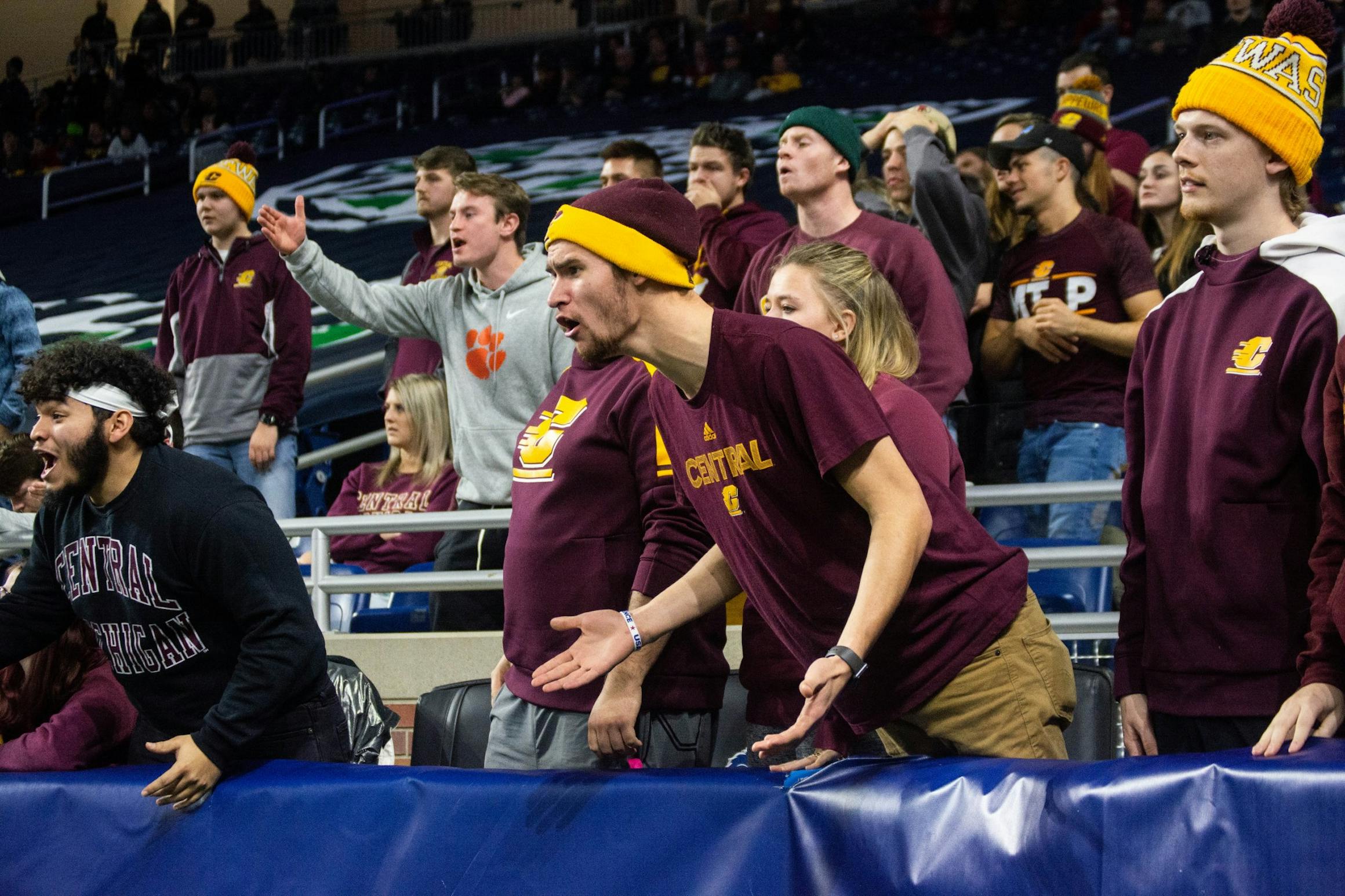Locals frustrated with Central-Western football rivalry moving to Ford Field
University officials did not inform Mount Pleasant Mayor William Joseph of their decision

Central Michigan President Bob Davies (left) and athletic director Michael Alford (right) speak with the media in a press conference at Ford Field to announce the CMU-WMU game moving to Detroit for the 2020 season. (Photo: CMU Athletics)
Many local business owners and community leaders were surprised when it was announced this week that the Oct. 17 Central Michigan-Western Michigan rivalry football game was being moved from Kelly/Shorts Stadium to Ford Field in Detroit.
No one was more stunned than Mount Pleasant Mayor William Joseph.
"I didn't get the heads up," said Joseph, who is a CMU alumnus. "So, um, obviously shocked and surprised. ... I'm not very excited about it."
The decision to move the historic game – which dates back to 1907 – was announced Feb. 26 along with the rest of the Mid-American Conference schedule.
As the rivalry enters its 91st matchup, the Oct. 17 clash will be the first Central-Western game played away from Mount Pleasant or Kalamazoo. The Chippewas will serve as the home team.
Many local business owners are unhappy. Hotels, bars and restaurants and shops rely heavily on the revenue earned during Western Weekend.
"We all feel like it's a bummer," said Jamie Pierson of the Mount Pleasant Area Chamber of Commerce. "It will make an impact (with local businesses), but I don't know how much. They'll definitely feel it."
Joseph said he first learned about the move to Ford Field after reading about it in Central Michigan Life. Neither President Bob Davies or athletic director Michael Alford spoke with him prior to the press conference.
"This is an athletic department program," Davies said. "I rely on the leaders of those areas to (communicate). This discussion about moving the game to Detroit was brought forward by Mr. Alford. I support it because of the long-term implications it has for our overall strategy."
With Davies' support, Alford chose to move the game's location for two reasons: To help increase enrollment and to engage alumni in Metro Detroit.
CMU's fall enrollment decreased 10.5 percent this year, plummeting from 21,705 in 2018 to 19,431 in 2019, according to the Michigan Association of State Universities. It was the steepest decline in the past decade and worst decline of Michigan's 15 public universities.
"This is much more than a football game," Davies said at a press conference with Alford, Lions president Rod Wood and Detroit Sports Commission senior vice president Dave Beachnau. "This is about Central Michigan's commitment to the Metro Detroit community."
Taking the rivalry from Mount Pleasant to Detroit is part of a long-term plan, Davies said. Even football coach Jim McElwain responded to the frustration from the community and explained the need to develop CMU's presence in Detroit.
"I’m sure that’s something our administrations and our university has talked to those people about," the second-year coach said. "We’ve got to make it a home game, and that’s what it’s going to be. Our presence as a university down there, down in Detroit, is something that we’ve got to capitalize on.”
With the choice to move the location brings questions about whether there will be measurable impact in the university's relationship with alumni and high school students based on a single football game.
Local are convinced that a short-term negative financial impact is guaranteed.
"I share some of the frustration," Joseph said. "Moving the CMU football game to Ford Field will definitely have some immediate economic impact on our local businesses and community."

From left to right: Detroit Lions president Rod Wood, CMU president Bob Davies, CMU athletic director Michael Alford and Detroit Sports Commission senior vice president Dave Beachnau pose for a picture following a press conference to announce the CMU-WMU game is moving to Ford Field in Detroit for the 2020 season. (Photo: CMU Athletics)
'It's definitely going to sting'
The Courtyard by Marriott, adjacent to Kelly/Shorts Stadium, expects to lose at least $60,000, if not more, during the weekend without the rivalry game.
The hotel's general manager, Scott Schurr, didn't say much other than sharing his feeling of betrayal and expressing his sorrow for all businesses in the area.
"It's a joke," Schurr said. "I don't understand why they're doing it."
Schurr wished he would've learned of CMU's decision – or even that a location change was being discussed – earlier in the process. Instead, he didn't find out until Feb. 25, when the news appeared on social media.
"Earlier would've helped tremendously," Schurr said. "We could budget for it."

(Photo: CMU Athletics)
Another business that could take a hit, Joseph said, is Soaring Eagle Casino and Resort. With a new sports bar, hotel rooms, the casino floor and the potential for sports gambling, Soaring Eagle would've been a top attraction for anyone traveling to Mount Pleasant for the game.
Those people will instead travel to Ford Field and likely stay at competing casinos like MGM Grand or Greektown Casino.
"People who might gamble for the Western-Central game will probably do that in Detroit," Joseph said. "(The casino) will be impacted as much as our local businesses and hotels. I'm sure they're scratching their heads as well."
When WMU comes to Mount Pleasant, students and fans celebrate Western Weekend. Students, visitors and alumni go out to local bars and clubs after the game, invite friends from the opposing university and banter about which team will gain bragging rights for the next year.
John Hunter owns O'Kellys Sports Bar & Grille, Wayside Central, The Cabin and Hunter's Ale House. Hunter declined to comment for this story, citing the recent stabbing at Wayside Central as his main concern at this time. Hunter's Ale House also serves as the venue host for the weekly "Coach Mac Show" on the radio throughout the season.
Many local businesses that attract students, like the bars owned by Hunter, typically make more on Western Weekend than they do in at least one month – sometimes up to three months.
Former Mount Pleasant City Commissioner Mike Verleger, a businessman and city resident, said the situation will "definitely sting" for everyone in town. He believes the financial losses will be "fairly substantial."
Dog Central owner Paul McFall – whose company is based on signature and classic hot dogs with a wide variety of toppings – didn't hear of CMU's decision until CM Life's report. He does not sponsor CMU Athletics, but if he did, he said the feeling would be simply noted – betrayal.
"At the end of the day, that decision is making a huge impact on the rest of the town," McFall said. "That's the part that really hurts."
McFall doesn't believe a football game in Detroit will drive a substantial increase to high school students that want to attend CMU. He also isn't sure if alumni will be impacted any more than if the rivalry was in Mount Pleasant.
"The college atmosphere is what gets those people here," McFall said. "That's what the game is about. You get to show off your campus in such an exciting way.
"I just think they're missing out on that, and that's the way you market your school – a huge weekend at your school – not in Detroit."

Why Detroit?
In order to revive the enrollment, Davies has increased marketing efforts in Detroit, Grand Rapids and Lansing.
While CMU's fall enrollment has fallen more than 10 percent in one year, WMU's has decreased by 4.8 percent, from 22,526 in 2018 to 21,470 in 2019.
Davies and Alford believe that playing the CMU-WMU game at Ford Field will ultimately bring an enrollment increase and successful outreach to alumni, of which more than 150,000 live in Metro Detroit. Roughly 50 percent of CMU students are from Metro Detroit, Davies said.
"The upside," Alford said, "there's too many of them not to make this happen."
Marcie Otteman, executive director of the alumni association, cited the attendance from the 2019 MAC championship, when CMU played Miami (Ohio), as a reason that proves moving the game to Ford Field will be successful.
If attendance based on recent showings at Ford Field is a signal of what the future holds, the rivalry being transitioned to Detroit for 2020 might benefit the Broncos. CMU brought in 22,427 for the December 2019 title game.
WMU drew more than double that amount for the 2016 championship – 45,615.
"What I can tell you is I have been fortunate to be a part of many CMU events at Ford Field and been amazed at the support we’ve received," Otteman commented in an email. "This has especially been true when our fans have had an extended lead time to plan, like they will for October’s game.
"I am confident that we will have a great CMU turnout and our team is looking forward to engaging with as many alumni as possible."
Davies believes moving the game to Ford Field will increase the student population, thus helping to drive local businesses to further success based on having more people in the area to accommodate.
"We are excited to bring a marquee game to Detroit, a critical area for the future of our university,” Davies said. “This is an outstanding opportunity for us to enhance our engagement with and outreach to students, alumni and businesses in Southeast Michigan.”





